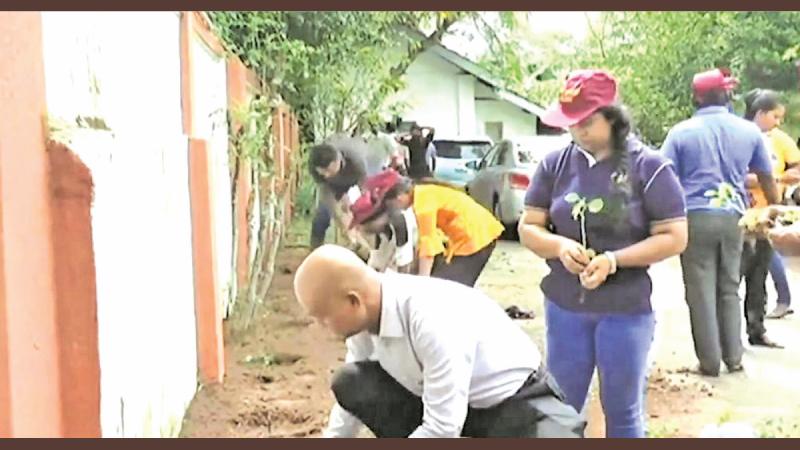
Many steps are being taken to overcome and manage the current food crisis on the President’s advice to ensure food security.
Formulating without delay a national fertiliser policy, distribution of uncultivated state land among young cultivators, launching a food promotion week with the participation of all provinces, allocating the Kankadu Farm for the cultivation of sorghum and other essential food crops, giving priority to agricultural, livestock and fresh water fishing industries, and making use of the phosphate deposit for meeting fertiliser needs are among the matters to which attention has been drawn. It is laudable that different groups have come forward to help in achieving this objective.
 On June 5 the University Teachers’ forum for the protection of Sri Lanka’s agriculture has presented a set of proposals to the Malwatte and Asgiriya Prelates and the Maha Sangha.
On June 5 the University Teachers’ forum for the protection of Sri Lanka’s agriculture has presented a set of proposals to the Malwatte and Asgiriya Prelates and the Maha Sangha.
Here the forum had drawn attention to three main issues. The possibility of the 2022 Yala crop failing due to the shortage of organic and chemical fertiliser, pesticides and weedicides, the threat of a food shortage due to the shortage of seed paddy causing the Yala crop 2022 to fail and the huge cost of importing food in the light of the dollar crisis. They have suggested a series of proposals to solve these problems.
Responding to these proposals the Malwatte Prelate the Most Venerable Thibbatuwawe Sri Siddhartha Nayaka Thera stressed on the need for using all land available for cultivation.
Many temples have launched various programs in this connection, according to the Prelate who also said that the people should be encouraged as far possible to engage in this task under the leadership of chief incumbents of temples.
In connection with the set of proposals Prof. Warshi Dandeniya of Soil Science Section of the Agricultural Faculty, Peradeniya University said that that they have proposed both short and long term proposals. However she said that as professionals in agricultural research they can only give guidance but it was up to the relevant institutions and officials to take the necessary steps.
The Agricultural Department and the Agricultural Ministry should take the lead in this matter. The immediate steps, according to her, is to provide sufficient chemical and organic fertiliser to help cultivate main crops and also manage the use of available pesticides and weedicides to meet target of maximum possible yields.
 The main crops are rice, tea (main source of foreign exchange), and also animal feed and sorghum. At the same time it is necessary to give priority to seed paddy since 6.4 million bushels of it are required for the next two Maha and Yala Seasons (2022/23 Maha and 2023 Yala). She also stressed on the need to focus on other crops like vegetables, chillies and onions. The Professor expressed her satisfaction that that the ‘Colombo’s Grow More Food’, campaign is taking the lead in this connection with contributions from the Agricultural Ministry, the Agriculture Department and the Agrarian Services Department guided by Ministry of Public Administration and Local Government.
The main crops are rice, tea (main source of foreign exchange), and also animal feed and sorghum. At the same time it is necessary to give priority to seed paddy since 6.4 million bushels of it are required for the next two Maha and Yala Seasons (2022/23 Maha and 2023 Yala). She also stressed on the need to focus on other crops like vegetables, chillies and onions. The Professor expressed her satisfaction that that the ‘Colombo’s Grow More Food’, campaign is taking the lead in this connection with contributions from the Agricultural Ministry, the Agriculture Department and the Agrarian Services Department guided by Ministry of Public Administration and Local Government.
The Homagama Pradeshiya Sabha Division took the first steps in this connection with the participation of temples and Seela Matha organisations of the area.
Ven. Prof. Magammana Pannananda Thera Chief Incumbent of the Shailaparvatharama Vihara, Homagama is the patron of the project.
Homagama Pradeshiya Sabha Secretary Daminda Chinthaka said that time has come to grow food crops even in small plots of land in household premises. This has drawn attention to premises of Pradeshiya Educational Offices, temples, schools, children’s homes among others.
Already the grow more food has begun in the every public and private sector areas covered by all 13 Pradeshiya Sabhas in the Colombo District where the total extent of land is about 7333 square kilometres.
Arrangements have been made to cultivate paddy on 734 hectares. Other crops will be cultivated on 939 hectares. In addition steps are being taken to cultivate 1045 hectares in the State sector ad private sector lands.
Programs have been launched to help farmers and agricultural societies with low-incomes. Officers with expertise on the agricultural and relevant fields have been appointed in all Pradeshiya Sabha divisions to expedite work.
The objective of all these programs is to ensure maximum yields from fertiliser used for small plots of land, according to Dr. Thilini A. Perera of the Plant Studies Faculty of the Colombo University.
In the event of shortage of chemical fertiliser it would be necessary to uses pesticides turned out from cinnamon, soap and neem leaves, she said.
Perera also said that further information in the area can be obtained from YouTube channels and agricultural applications.
